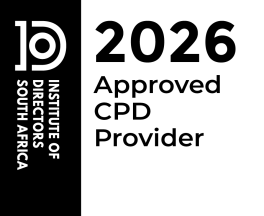
Corporate governance procedures help a business become more effective in value creation while reducing both risk and the potential for corruption, fraud, mismanagement and failure.
If you are not trained in law, you may be surprised by the number of rules, regulations and laws you may break while operating a business, without even knowing it! A good corporate governance programme can boost your competencies, ensure discharge of fiduciary duties of directors, including managing conflicts of interests as well as navigating risksand opportunities, including ensuring a sustainable strategy. Organisations following a set of good corporate governance principles and best practices will tend to act in the best interest of the organisation and its stakeholders, building trust reputation and legitimacy, as well as enjoying greater sustainable value creation.
This course will cover the latest principles and best practices of corporate governance including King V and CRISA 2 and responsibilities of directors and institutional investors, discussing key trends as well as using relevant case studies in a group discussion format.
When and where?
This course will be presented twice in 2026:
| Dates and times | Platform / venue | Fee |
| 31 March to 2 April 2026, 9:00 to 16:30 SAST (three full days) Download brochure | Remote (most likely on Zoom) | R12,980 |
| 9 to 11 September 2026, 9:00 to 16:30 SAST (three full days) Download brochure | Face-to-face at UCT | R13,900 |
Course outline
The following topics will be dealt with during the course:
- An overview of corporate governance
- International corporate governance trends
- The evolution of corporate governance in South Africa
- Understanding ESG and sustainability
- A high-level review of King V including ethical and effective leadership
- Regulation and legal entities
- Directors' and prescribed officers' including role and responsibilities and business judgement rule
- Board committees including Audit/ Risk/ Social & Ethics/ Remuneration/ Nomination
- Governance of strategy
- Role of the Company Secretary
- Risk governance and risk management
- Assurance
- Data, information and technology governance
- Integrated reporting/transparency and disclosure
- Remuneration governance
- Institutional shareholders’ critical role including a high-level overview of CRISA 2
Various case studies will be utilised in a group discussion format.
Who will benefit from this course?
Business owners, corporate lawyers, compliance officers, risk managers, company secretaries, ESG / sustainability and stakeholder managers, current and aspirant directors, board committee members, senior managers, and officers/executives charged with governance duties in an organisation.
Presenter
Richard Foster is a corporate governance advisor and professional independent director/chairman. He is a chartered governance professional and a chartered director and his qualifications and professional designations include CD (SA), FCG (CS, CGP), HFinstD, HDip Company Law (Wits), HDip Tax Law (RAU); PG Dip Corporate Governance (RAU) with distinction. Richard has held senior leadership positions in two of the largest Global Groups based in South Africa during his corporate career. Prior to joining Old Mutual in 2001, where he held the position of Group Secretary until July 2013, the bulk of his career was spent with Anglo American, inter alia, occupying the position of Group Secretary of Mondi Limited. He has over the years had responsibility for Corporate Governance, Corporate Secretariat, Corporate Risk & Insurance and Legal Services operating at a national as well as international level. Richard has been extensively involved in various corporate governance initiatives in the broader business environment and has participated as a speaker and panellist in a number of business seminars and forums over the past years, both locally and overseas has been published as a co-author of various articles in certain leading international academic law journals. Richard served as Non-Executive Chairman of the Institute of Directors in South Africa and is a current member of the King Committee on Corporate Governance and was a member of the Task Team and Advisory Group responsible for the drafting of King IV and King V respectively. Richard is also a founding and current member of the CRISA Committee, which undertook the drafting of the Code for Responsible Investing in Southern Africa as well as CRISA 2 in 2022 applicable to Institutional Investors.
CPD accreditation
This course has been registered with the Institute of Directors of South Africa (IoDSA) and entitles you to 20 CPD points on completion.

Certificate
A digital certificate of attendance from UCT will be issued to those who attend the full course.
Please note that the digital certificate can only be viewed on a secure portal. It cannot be downloaded or printed. You will have the option of ordering a hard copy of the certificate at your own cost, including the cost of the courier fee. More information is available here.
No certificate will be issued without the full course fee having been received. Please allow up to three weeks after the end of the course for certificates to be processed.
How to sign up
Please note: Only 25 spaces are available. Payment confirms registration. Once the available places have been filled, additional registrations will be added to a waiting list.
Complete and submit the registration form. You will then be given the payment information. Please note that registrations will not be accepted until payment has been made.
One week before the course, we will send you information regarding the programme and directions to the venue.
Registrations close seven days before the course starts.
